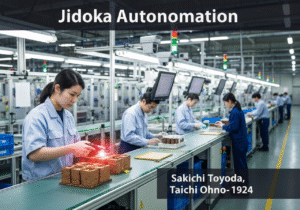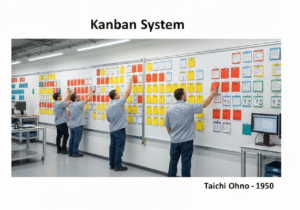A principle of lean produzione that means ‘automation with a human touch’.
- Metodologie: Ergonomia
Jidoka

Jidoka
- Miglioramento continuo, Just-in-Time (JIT), Kaizen, Produzione snella, Tecniche di risoluzione dei problemi, Miglioramento dei processi, Gestione della qualità, Sistema di produzione Toyota (TPS)
Obiettivo:
Come si usa:
- A lean manufacturing principle that empowers workers to stop the production line when they detect a problem. This helps to prevent defects from being passed down the line and allows for immediate problem-solving.
Professionisti
- Improves quality by preventing defects; Empowers workers and promotes a culture of continuous improvement.
Contro
- Can be difficult to implement in a traditional manufacturing environment; Requires a high level of trust and training.
Categorie:
- Lean Sigma, Produzione
Ideale per:
- Improving quality and empowering workers in a manufacturing environment.
Jidoka, often associated with the Sistema di produzione Toyota, is applied in various manufacturing sectors, including automotive, electronics, and consumer goods, where maintaining high quality is paramount. This methodology is typically initiated during the design and implementation phases of production systems, requiring involvement from frontline workers, management, and quality assurance teams to establish protocols for stopping the line. An example of Jidoka in action can be seen in automotive assembly lines, where operators are trained to identify anomalies, such as incorrect part placements or defects, leading to immediate intervention. The integration of Jidoka not only enhances product quality by ensuring that defects are caught early but also promotes a sense of ownership among workers, facilitating a culture where continuous improvement becomes part of daily operations. Such engagement encourages employees to contribute ideas for process optimizations and defect prevention, further strengthening the manufacturing system. Additionally, technology plays a supportive role in Jidoka applications, as automated systems and sensors can assist workers in identifying issues, allowing for quicker reaction times and reducing downtime. Organizations adopting this principle often experience reductions in waste and inefficiencies, translating into cost savings and improved customer satisfaction.
Fasi chiave di questa metodologia
- Identify abnormalities or defects during the production process.
- Stop the production line immediately when a problem is detected.
- Address the root cause of the issue on-site.
- Implement corrective actions to resolve the problem.
- Verify the effectiveness of the solution before resuming production.
- Standardize successful solutions for future reference.
- Encourage continuous feedback and discussions on process improvements.
Suggerimenti per i professionisti
- Implement real-time data analytics to support workers in identifying trends and potential issues before they escalate.
- Designate cross-functional teams that include operators, engineers, and quality experts to routinely analyze stoppages and develop robust root cause analysis protocols.
- Create a feedback loop where operators can share insights on their experiences, leading to actionable items that can improve processes and training programs.
Leggere e confrontare diverse metodologie, raccomandiamo il
> Ampio archivio di metodologie <
insieme ad altre 400 metodologie.
I vostri commenti su questa metodologia o ulteriori informazioni sono benvenuti su sezione commenti qui sotto ↓ , così come tutte le idee o i link relativi all'ingegneria.
Contesto storico
1850
1890
1924
1930
1940
1950
1950
1958
1886-04-23
1897
1930
1940
1949
1950
1950
(se la data non è nota o non è rilevante, ad esempio "meccanica dei fluidi", viene fornita una stima approssimativa della sua notevole comparsa)















Post correlati
Simulazione di Monte Carlo
Test basati su modelli
Controllo del modello
Ricerca con metodi misti
A prova di errore (Poka-Yoke)
Test del profilo di missione